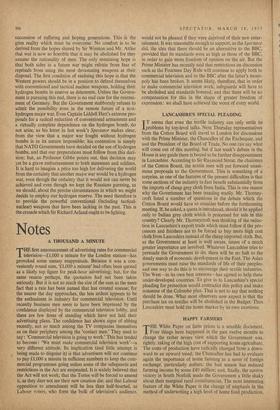LANCASHIRE'S SPECIAL PLEADING I T seems that even the textile industry
can only settle its problems by top-level talks. Next Thursday representatives from the Cotton Board will travel to London for discussions with the Prime Minister, the Chancellor Of the Exchequer, and and the President of the Board of Trade. No one can say what will come out of this meeting, but if last week's debate in the House is any guide there is bound to be further disappointment in Lancashire. According to Sir Raymond Streat, the chairman of the Cotton Board, the textile men will put forward unani- mous proposals to the Government. This is something of a surprise, as one of the features of the present difficulties is that some sections of the industry in fact benefit substantially from the imports of cheap grey cloth from India. This is one reason why the Government has been treading warily. Mr. Thorney- croft listed a number of questions in the debate which the Cotton Board would have to consider before the forthcoming meeting. If, he asked, a quota is introduced, should it be applied only to Indian grey cloth which is processed for sale in this country? Clearly Mr. Thorneycroft was thinking of the reduc- tion in Lancashire's export trade which must follow if the pro- cessors and finishers are to be forced to buy more high cost cloth from Lancashire instead of the cheap imported cloth. But, as the Government at least is well aware, issues of a much greater importance are involved. Whatever Lancashire tries to persuade the Government to do, there will be no halt to the steady march of economic development in the East. The Asian governments must raise the standards of life of their peoples. and one way to do this is to encourage their textile industries. The West—in its own best interests—has agreed to help these under-developed countries. To give in to Lancashire's special pleading for protection would contradict this policy and make nonsense of the Colombo plan. That is not to say that nothing should be done. What most observers now expect is that the purchase tax on textiles will be abolished in the Budget. Then Lancashire must hold the home market by its own exertions.










































 Previous page
Previous page